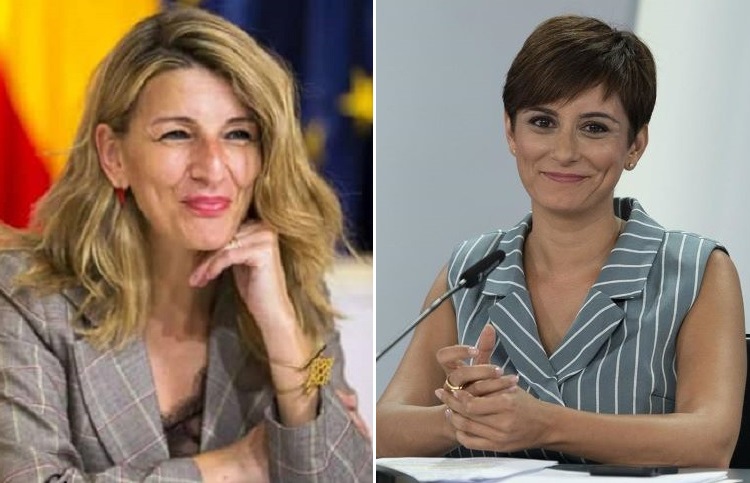The Diplomat
The minority partner of the coalition Government, Unidas Podemos, could not prevent yesterday the approval in the Council of Ministers of a credit of almost one billion euros for Defense spending. However, it did show again its rejection of the increase in military spending by demanding, in the mouth of Vice President Yolanda Diaz, an urgent meeting of the monitoring committee of the coalition pact, a request that the Government described as “usual and normal”.
“As a member of the European Union and NATO, Spain has participated in all the sanction measures and we have materially supported the Ukrainian Government and people for their legitimate defense”, declared yesterday the Government spokeswoman, Isabel Rodríguez, in the press conference after the Council of Ministers, in which she announced the decision of the Executive to authorize the application of the Contingency Fund in the amount of 999. 793,477 Euros and the granting of an extraordinary credit in the Ministry of Defense to “attend the extraordinary expenses of the Armed Forces caused by the invasion of Ukraine”.
The approval of an extraordinary expenditure of one billion Euros had been advanced last week by the President of the Government, Pedro Sánchez, at the end of the NATO Summit in Madrid. At that press conference, the head of the Executive also announced his intention to put before the Spanish Parliament a “country agreement” to reach 2% in defense spending in 2029 (therefore, five years after the date of 2024 established at the NATO Summit in 2014).
After Sánchez’s words, the president of the PP, Alberto Núñez Feijóo, assured that his party will support the increase in the military budget, although the party’s vice-secretary for Institutional Affairs, Esteban González Pons, only a day later asked the Government to explain “where it is going to get the money to pay the additional 12,000 million euros”. For her part, the Secretary General, Cuca Gamarra, demanded last week a “joint position of the whole Government” because “if there is no joint position of the whole Government, what is in question is the State position of the Government”.
Precisely, and as expected, the president of the parliamentary group of Unidas Podemos, Jaume Asens, yesterday harshly criticized the “decree for the war” approved by the Council of Ministers and accused the PSOE of “disloyalty” for the ways used to move forward, “through the back door”, the credit of one billion Euros for Defense.
For her part, the second vice-president of the Government, Yolanda Díaz, informed yesterday that Unidas Podemos had asked the PSOE for an urgent meeting of the monitoring commission of the coalition pact in view of the differences on the increase of military spending and the “concern” that it generates that, in the midst of inflation, the items for Defense reach 22,000 million euros. Regarding this request, the Government spokeswoman declared in the press conference that the meeting of the requested follow-up pact “is part of the coalition agreement” and is, therefore, something “usual and normal”. She also assured that the PSOE was already aware of Díaz’s request and that no date has yet been set for the meeting. Rodriguez also stated that Unidas Podemos already knew about the increase in Defense spending because this issue “was addressed last week” in the Committee of State Undersecretaries and Secretaries.
The last time the coalition’s follow-up pact met was during the negotiation of the labor reform, specifically due to the “attempts of interference” of the Vice President, Nadia Calviño, in the competences of Yolanda Díaz, denounced by Unidas Podemos. That meeting concluded with a consensus agreement that made it possible to combine the defense of the collegiate work of the Government with the leadership of Díaz in the negotiation of the labor reform.
Albares and Robles
The Minister of Foreign Affairs, José Manuel Albares, said yesterday, during his speech at the conference The future of NATO after the Madrid Summit -organized by the newspaper El Español and the Ministry of Foreign Affairs at the Diplomatic School- and just after attending the Council of Ministers that approved the billion credit for Defense, that all the allies have committed themselves to “increase economic contributions to NATO”, to “reach 2% of GDP in defense investment” and to “develop innovation in the face of new threats”, which, in the case of Spain, translates into voluntary adhesion to the new Innovation Fund promoted by NATO Secretary General, Jens Stoltenberg, during the Madrid Summit. “Spain has one of the most advanced defense industries in Europe and it is essential to support it, because it is also the basis of our autonomy and sovereignty, of Spain in Europe and of Europe in the world,” he said.
For her part, the Minister of Defense, Margarita Robles, called for “unity and open-mindedness” in matters of defense and security, recalled that a recent survey by the Real Instituto Elcano shows that 83 percent of Spaniards support NATO and assured that Spain will continue to collaborate with the Atlantic Alliance as a “serious and reliable ally” and that the Spanish Armed Forces will continue to participate in the missions. Robles did not want to respond to journalists about the differences in the coalition government regarding defense spending.
During a debate in Congress, the Minister of Social Rights and leader of Podemos, Ione Belarra, affirmed this past Monday that Spain “does not need” to buy “bombs or fighter planes” because of “the demands of a foreign power”, in reference to the United States. In her reply, Margarita Robles recommended her government colleague to invite Yolanda Díaz to say “in Ferrol that the F-110 frigates, which are creating many jobs, should stop being built there”. Díaz replied, in turn, to Robles assuring that the increase in military spending planned by the PSOE has no repercussion on the activity of Navantia in Ferrol, because it is destined, for the most part, to the acquisition of new weapons and troop protection services.







